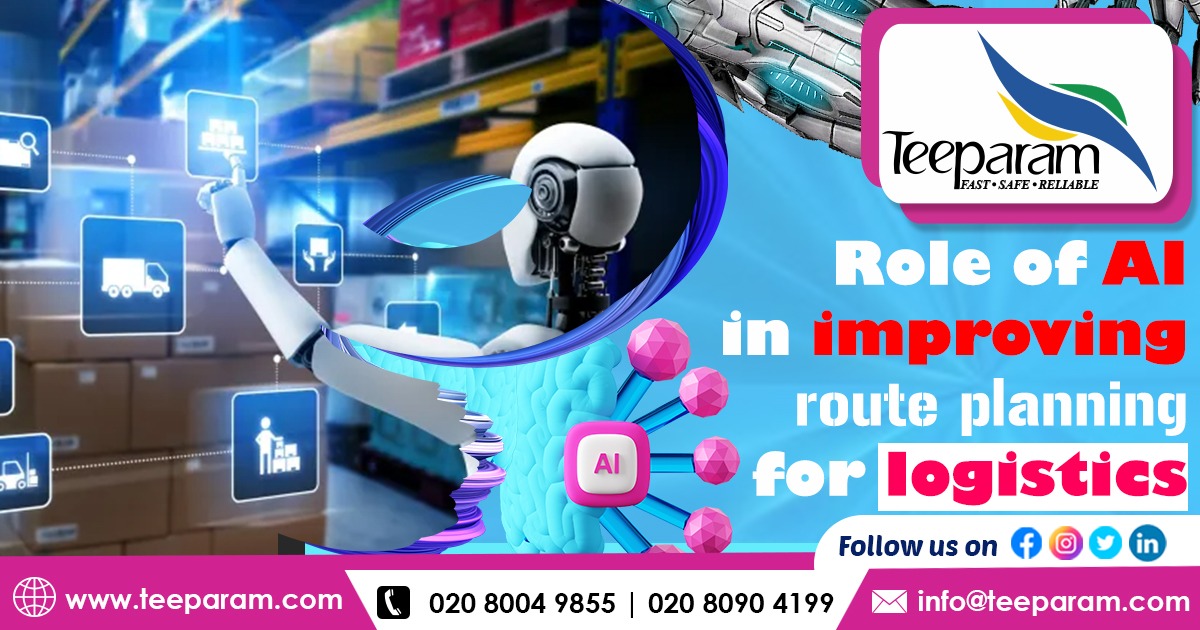Effective route planning for logistics industry needs to remain competitive, as customers increasingly prefer quicker delivery options. They face challenges such as delays, high fuel costs, and customer dissatisfaction more often. Fortunately, Artificial Intelligence (AI) has the potential to transform the landscape. With the help of AI, route planning for logistics being revolutionized by making it faster, smarter, and more reliable.
By utilizing big data, machine learning, and predictive analytics, AI can help companies plan better routes, reduce delivery times, and save money. How exactly does the AI improve route planning and the many benefits it brings to logistics operations?
Why does logistics need Route Planning?
By route planning, logistics companies can determine the most efficient path for vehicles to deliver goods. It needs to take into account several factors, such as traffic conditions, delivery time windows, vehicle capacity, road restrictions, and fuel consumption.
Route planning often depends on manual input or basic software tools, which are usually time-consuming and less accurate, but AI can eliminate such issues.
How Route Planning Can Be Transformed by Using AI
- Automation of Route Planning
AI is capable of handling complex calculations faster than humans or simple software. Systems that use AI automate route planning by analyzing multiple factors at once—like traffic patterns, delivery priorities, weather, and vehicle load.
This makes logistics managers’ work less complicated, as they no longer need to spend hours creating delivery schedules. AI can do this within seconds, offering the most efficient routes with little to no manual work.
- Real-Time Traffic Analysis
This is one of the most helpful features of AI. AI accesses traffic data from GPS, sensors, and public traffic feeds and then uses this information to make the best moves for your delivery.
AI can quickly offer alternative routes if there’s an accident or heavy traffic on the planned route. This can make the deliveries fast and keep them on schedule, improving both efficiency and customer satisfaction.
- Delay Management through Predictive Analytics
AI is not only helpful in real-time conditions, but it can also predict future problems. AI systems are capable of predicting delays or route disruptions by using historical traffic data, weather forecasts, and delivery trends.
Logistics providers can take proactive steps to reroute vehicles, avoid slowdowns, and keep operations smooth with the help of AI.
- Best Route Adjustments
AI is capable of providing a secondary route instantly if a customer changes their delivery address last minute or a road suddenly becomes blocked. It provides dynamic routing while your goods are on the go.
Delivering goods can often face unexpected delays; therefore, flexibility is essential in logistics. Dynamic routing helps cut down wasted time and ensures on-time delivery.
- Integration with IoT and Telematics
AI can perform well when connected to IoT (Internet of Things) devices and telematics systems. Sensors connected to vehicles can collect data on engine health, speed, fuel usage, and driver behavior.
These data are then analyzed by the AI in real-time to make smart decisions on selecting the route. For example, AI can reroute a vehicle to a nearby station that is low on fuel. Likewise, if a driver is running out of working hours, AI can adjust the route to stay within legal limits.
- Improving Last-Mile Delivery
AI can help with the most difficult and expensive final step of the delivery process by:
- Providing maximum efficiency to delivery sequences
- Providing the best time for each delivery
- Giving drivers clear instructions for multiple stops
This will not only save time and fuel but also ensure packages reach customers fast and on time.
- Machine Learning Aids Continuous Improvement
Machine learning over time can improve the AI systems, making them smarter. AI can learn from past deliveries and analyze what worked and what didn’t, then improve its algorithms.
The more you keep using AI for route planning, the better it becomes. As a result, your logistics operations will become more efficient and reliable over time.
What are the benefits of AI-driven route optimization?
- Increased efficiency in operations
AI helps to cut down travel time and speed up delivery schedules, resulting in fewer delays, fewer missed deliveries, and improved utilization of vehicles and drivers.
- Cost Reduction
AI can eliminate extra mileage and idle time, allowing companies to save money on fuel, vehicle maintenance, and labor. Little improvements in route planning can lead to big savings over time.
- Maximum utilization of resources
AI can make sure that every vehicle carries a full load and every delivery person is assigned tasks based on their location and availability. It allows logistics companies to use resources more smartly.
- Reduce impact on the environment
Cutting down the mileage reduces the fuel usage. This helps companies to cut down their carbon footprint and support global sustainability goals.
- Improved Customer Satisfaction
Customers do not complain if the deliveries are made on time, with live tracking, and with fewer mistakes. If your customers are well satisfied with your service, they will stay loyal and recommend your service to others.
- Scalability and Flexibility
Since the AI can adapt easily according to the demands, it will handle more deliveries without lowering the efficiency as your business grows.
- Better Decision-Making
Logistics managers can make better business decisions with data-driven insights provided by the AI that help with long-term planning and forecasting.
Now think of a delivery company with 50 vehicles handling hundreds of daily orders in a large city. If they run without any help from AI, the route planning may take more time, resulting in late deliveries and extra fuel costs.
On the other hand, with AI:
- Routes will be planned in no time.
- Vehicles can avoid traffic jams automatically.
- Drivers can make more deliveries in less time.
- Drop in fuel usage.
- Can provide accurate delivery time updates to customers.
Automation, intelligence, and adaptability provided by AI are transforming route planning in the logistics industry. Options such as last-minute route changes thanks to real-time traffic analysis by AI enable logistics companies to work smarter.
Nowadays, using AI for route optimization has become a necessity to provide a better service for the growing demand for deliveries and to satisfy the rising customer expectations. Teeparam is also offering other services that includes Money transfer through which you can send money to Sri Lanka and get competitive rates.



